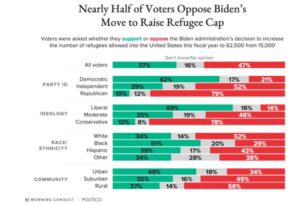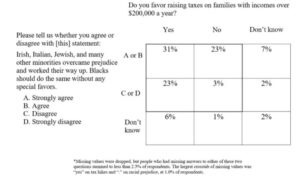The more we look at Joe Biden’s job approval ratings, the more it looks like the continuation of a pattern, as I explained at New York:
One of the regular themes of poll watchers during the Trump presidency was the remarkable stability of this very unstable man’s job-approval ratings compared with every available precedent. Two days after he left office, an NBC News analysis put it all into perspective:
“Former President Donald Trump’s time in office is over. He’s been impeached twice and banned from Twitter, Facebook, Instagram and Snapchat. But if his presidency was a roller coaster, his approval ratings were not.
“Trump left office with steadier approval ratings than his most recent predecessors, an analysis of NBC News/Wall Street Journal polling data from January 1993 to this January shows. Trump’s approval rating remained within the same 9-point range for his entire presidency: 47 percent at its highest in October 2018, and 38 percent at its lowest in October 2017.”
Barack Obama, by contrast, had a 21-point “band” of approval ratings, which in turn was vastly less volatile than George W. Bush’s 62-point variation between highest and lowest ratings. Trump’s numbers were so uncannily consistent that every time we all wondered if they were finally about to change for better or for worse, instead they lapsed back into moderately underwater territory. It adds to the weirdness that this politician — who was elected president in 2016 despite a terrible favorability ratio (significantly exceeding in disfavor his unpopular opponent) — came very close to winning a second term despite never posting a net-positive job-approval rating in the polling averages.
Now we are five months into the Biden presidency, and guess what? The new president’s job approval ratings, while higher than Trump’s, are also very — in fact, historically — stable, as Harry Enten observes:
“A lot has happened since Biden took office: We’ve seen a failed impeachment trial, a major economic and coronavirus relief package signed into law and the continuation of a mass vaccination campaign leading to more than 60% of adults with at least one a Covid-19 shot nationwide.
“All of this has happened — and the national political environment has remained stagnant. It’s almost as if no event seems to really change public opinion.”
Biden’s approval rating today is pretty much the same as it was a month ago (54%). It’s the exact same as it was at the beginning of his presidency (53%). Any movements can be ascribed to statistical noise.
Some of us (myself included) have wondered if the contrast between the fairly dramatic real-world developments that occurred early in Biden’s presidency and his virtually unchanging approval ratings reflected his deliberately low-profile approach to governing. But it was pretty hard to ignore the fact that partisan polarization best explained the actual numbers, as I noted last month:
“The most striking thing about Biden’s approval ratings is the degree of partisan polarization. It’s off the charts, according to Gallup data. When I wrote about this a couple of months ago, the partisan gap in Biden job approval was a record 87 percent (98 percent approval among Democrats, 11 percent among Republicans). The March Gallup numbers put the gap at 86 percent (94 percent approval among Democrats, and 8 percent among Republicans). These are more extreme splits than we saw under the exceptionally polarizing Trump, and they make the partisan atmosphere under George W. Bush and Barack Obama look like Edens of consensus.”
At some point, you wind up wondering with Enten if no event seems to really change public opinion. That would suggest that Americans have become so tribal in their partisan preferences that neither the turbulent Trump nor the placid Biden — nor anything either of them is doing or undoing — can shake people out of their allegiances. Indeed, I expressed a similar suspicion back in 2019 that wound up predicting the outcome of the 2020 race more than any of my election forecasting:
“My guess is that the narrow band of favorability and job approval numbers for Trump is just another testament to the partisan polarization that made it possible for him to win in 2016, despite his unpopularity. He cannot fall too far, even when he’s behaving in his signature beastly manner, because Republicans will sustain him …
“There are circumstances under which he can transcend his many handicaps by demonizing his opponent, revving up the MAGA people, and taking advantage of an Electoral College system which does not weigh popular votes equally.”
The events of January 6 finally created a bit of a drop in Trump’s popularity among Republicans, but he seems to have quickly recovered that ground and reestablished himself as the boss of his party at both the rank-and-file and elite levels. What matters most, in the long run, is not whether Republicans remain loyal to Trump personally, but whether the partisanship and extremism he represents remain politically cost-free to those emulating his example. There’s abundant evidence it is.
So the temptation for today’s and tomorrow’s Republicans is to let no demagogic opportunity to “energize the base” go unexploited in order to goose partisan turnout the way Trump clearly did. The natural anti–White House trend in midterm elections, reinforced by the Republican advantage in redistricting, is extremely likely to award the GOP with control of the U.S. House in 2022, and with more than its share of battleground state victories in gubernatorial, secretary of state, and legislative contests, leaving the party in good shape for a 2024 comeback with or without Trump as the vengeful candidate of a militant and happily extremist MAGA base.
There are still some swing voters out there to be captured. But as both the 2016 and 2020 Trump campaigns illustrated, a strategy of demonizing the opposition can simultaneously energize the base and sway the undecided with a lesser-of-two-evils appeal.
There are obviously reciprocal lessens for Democrats in this tale. Any fears that pursuit of a too-ambitious agenda by Biden and congressional Democrats will hurt the party in 2022 are probably misplaced; Democrats are likely to lose some ground in the midterms with either a timid or an audacious governing strategy, so they might as well get as much done as possible. And, ironically, the fact that Joe Biden the Fighting Liberal has the same exact level of popularity as Joe Biden the determined bipartisan centrist may show that a more progressive successor would do just fine, or perhaps better, if she or he could mobilize the Democratic base more effectively.
It appears more and more likely that America is in a perilous moment at which the zeal of our two warring tribes matters more in determining the nation’s fate than the identity of its leaders or even the consequences of their policies. That’s not the “new normal” of the Biden presidency most observers had in mind, but it explains a lot.





